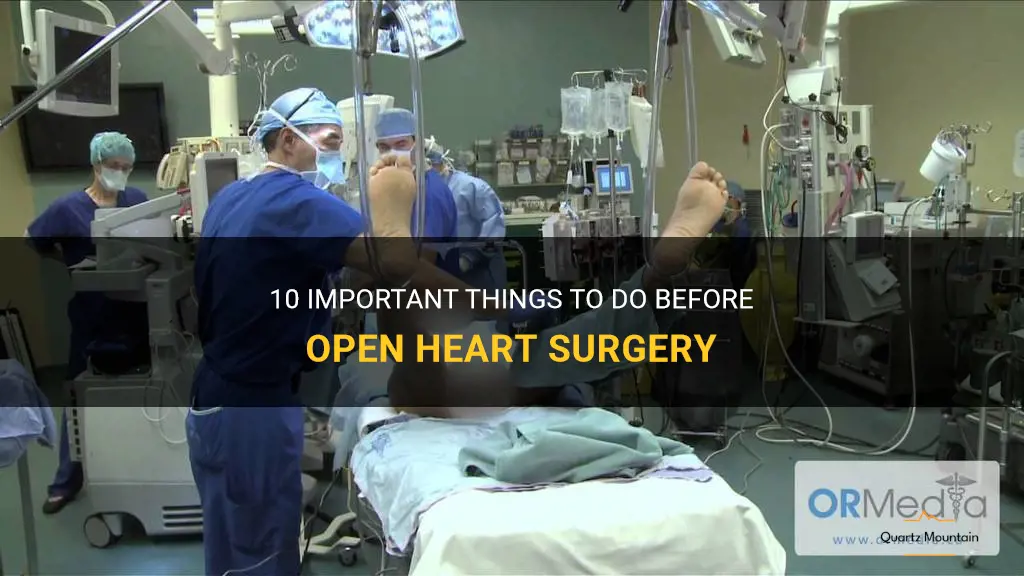
Open heart surgery is a major and complex procedure that requires careful preparation and planning. It is important to take certain steps before undergoing this surgery to ensure the best possible outcome. From quitting smoking to arranging for post-surgery support, this article explores 10 important things to do before open heart surgery. By following these steps, patients can enhance their chances of a successful surgery and a smooth recovery. So, if you or a loved one is scheduled for open heart surgery, read on to discover the crucial preparations that can make a world of difference.
| Task | Description |
|---|---|
| Complete pre-operative assessment | Meet with surgeon and anesthesiologist to discuss surgery preparations and medical history |
| Get blood tests | Evaluation of blood counts, clotting factors, and other important lab values |
| Prepare for anesthesia | Discuss anesthesia options and potential risks with the anesthesiologist |
| Stop taking certain medications | Discontinue medications that may increase bleeding or interfere with anesthesia |
| Arrange for transportation | Make arrangements for a ride to and from the hospital |
| Stop eating and drinking | Follow fasting instructions provided by the surgical team |
| Pack a hospital bag | Bring essential items for the hospital stay, such as comfortable clothing |
| Follow pre-surgery instructions | Adhere to specific instructions regarding bathing, skincare, and medication use |
| Inform healthcare providers | Share a list of all current medications and any known allergies |
| Arrange for post-surgery care | Make arrangements for home care or rehabilitation if necessary |
What You'll Learn
- Consult with your surgeon to fully understand the procedure and ask any questions you may have
- Complete any necessary pre-surgery tests and evaluations
- Inform your healthcare team of all medications and supplements you are currently taking
- Follow any pre-surgery instructions, such as fasting or stopping certain medications
- Make arrangements for transportation to and from the hospital
- Prepare your home for your recovery period, including arranging for assistance if needed
- Plan for any needed time off work or other commitments
- Pack a hospital bag with essentials like comfortable clothing and personal items
- Arrange for someone to take care of any pets or plants while you are in the hospital
- Take care of any financial or insurance matters related to the surgery

Consult with your surgeon to fully understand the procedure and ask any questions you may have
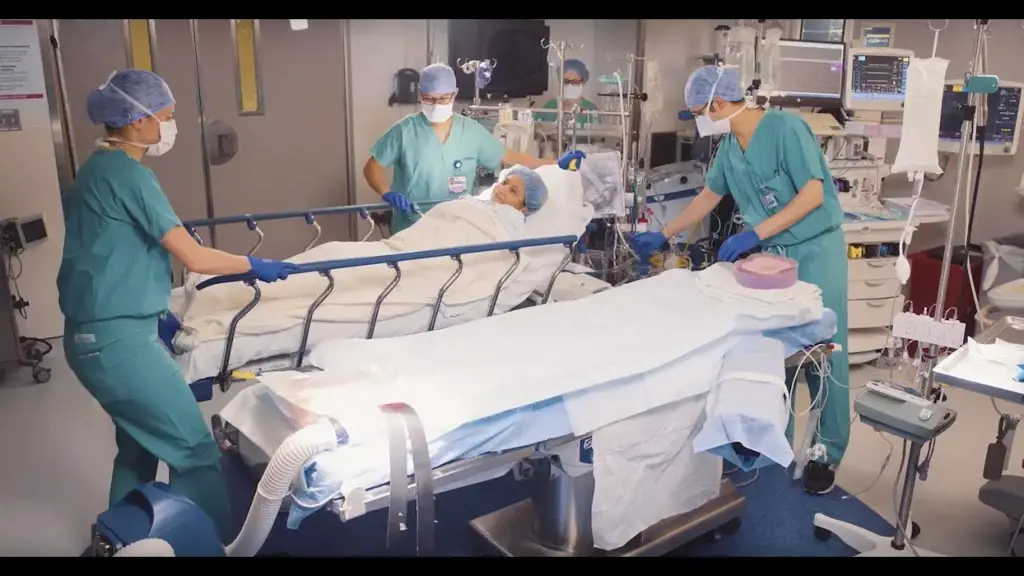
Before undergoing open heart surgery, it is important to be well prepared and fully understand the procedure. Consulting with your surgeon is a crucial step in the process as it allows you to address any concerns or questions you may have. Here are a few things to keep in mind when meeting with your surgeon before open heart surgery.
Firstly, it is important to compile a list of questions and concerns that you want to discuss with your surgeon. This may include queries about the specific details of the surgery, potential risks and complications, recovery time, and any lifestyle changes that may be necessary after the procedure. Write down these questions beforehand so that you don't forget anything during the appointment.
During the consultation, make sure to ask your surgeon about their experience and expertise in performing open heart surgery. It is essential to have confidence in your surgeon's skills and knowledge, as this will contribute to your overall peace of mind before the procedure. Don't hesitate to ask about their success rates and if there have been any complications in their previous surgeries.
While discussing the procedure itself, ask your surgeon to explain it in detail. Understand the reasons for the surgery, what will happen during the procedure, and what specific benefits it will bring to your health. It is also important to be aware of any potential risks and complications associated with open heart surgery, so do not hesitate to seek clarification on these matters.
Inquire about the expected recovery time and any limitations you may have during the healing process. This will help you mentally and physically prepare for the post-surgery period. Understand any lifestyle changes you may need to make in order to have a successful recovery. This may include dietary modifications, exercise routines, medication usage, and other follow-up appointments that need to be scheduled.
Additionally, bring up any concerns you may have about post-operative pain management. Understand what kind of medication will be prescribed, how often it should be taken, and if there are any alternative pain management options available. Recognize the signs of complications and know when to seek medical assistance during the recovery period.
Lastly, ask for any additional resources or educational materials that can provide more information on open heart surgery. Being well-informed about the procedure will help alleviate anxiety and aid in the decision-making process.
In conclusion, it is essential to consult with your surgeon before undergoing open heart surgery. By discussing the procedure, asking questions, and seeking clarification on any concerns, you can better prepare yourself both mentally and physically. This consultation will not only provide valuable information about the surgery but also establish a relationship of trust and confidence with your surgeon, which is crucial for a successful outcome.
12 Top Things to Do in the Hunter Valley
You may want to see also

Complete any necessary pre-surgery tests and evaluations

Open heart surgery is a major medical procedure that requires careful preparation to ensure a successful outcome. If you have been scheduled for open heart surgery, there are several things you should do before the surgery to ensure that you are ready for the procedure. One of the most important steps is to complete any necessary pre-surgery tests and evaluations.
These tests and evaluations are crucial for your healthcare team to gather the necessary information about your health status and to assess your readiness for the surgery. They may include blood tests, electrocardiograms (ECGs), imaging tests such as echocardiograms or stress tests, and consultations with various specialists.
Blood tests are used to assess your blood type, check for any infections or abnormalities, and evaluate your kidney and liver function. These tests will provide your healthcare team with important information about your overall health and any potential risk factors that need to be addressed before the surgery.
An electrocardiogram (ECG) is a test that records the electrical activity of your heart. It can detect any irregularities in your heart rhythm, which can help your healthcare team determine the best course of action for your surgery. If any abnormalities are found, further tests or treatments may be required before proceeding with the surgery.
Imaging tests such as echocardiograms or stress tests may be ordered to evaluate the function and structure of your heart. These tests can provide detailed information about the size of your heart chambers, the strength of your heart muscle, and the function of your heart valves. This information is important for your healthcare team to plan and perform the surgery effectively and safely.
Consultations with various specialists are also a necessary part of the pre-surgery evaluation process. You may need to see a cardiologist, an anesthesiologist, and other specialists depending on your specific case. These specialists will review your medical history, discuss the surgery with you, and address any concerns or questions you may have. They will also assess your overall health and identify any additional tests or treatments that may be necessary before the surgery.
Completing all the necessary pre-surgery tests and evaluations is vital to ensure that you are in the best possible condition for open heart surgery. By doing so, you can minimize the risks associated with the procedure and increase your chances of a successful outcome. It is essential to follow all the instructions given by your healthcare team and to communicate any changes in your health or medications leading up to the surgery. This will help ensure that you are well-prepared and ready for the surgery.
12 Exciting Activities to Experience in Whitehall MT
You may want to see also

Inform your healthcare team of all medications and supplements you are currently taking
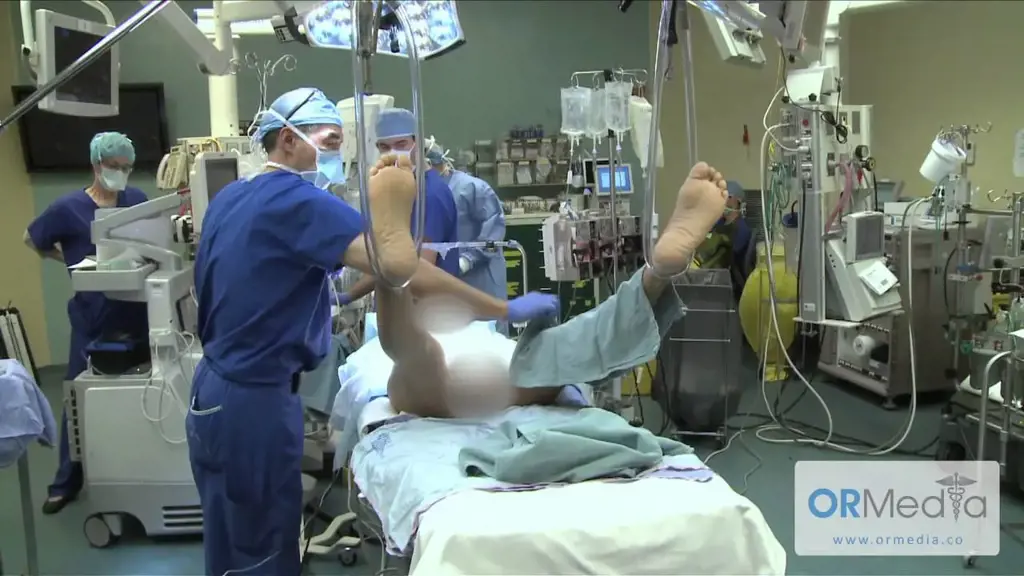
Before undergoing open heart surgery, it is crucial to inform your healthcare team of all medications and supplements you are currently taking. This is important because certain medications and supplements can interact with the medications and anesthesia used during surgery, potentially leading to complications. By providing a comprehensive list of all the substances you are regularly taking, you can help ensure a smoother and safer surgery.
Here are a few steps you should take to inform your healthcare team about your current medications and supplements:
- Create a detailed list: Make a list of all the prescription medications, over-the-counter drugs, vitamins, and supplements you take regularly. Include the name of the medication or supplement, the dosage, and how often you take it. Be sure to update this list if any changes occur before your surgery.
- Consult your primary care physician: Before your surgery, schedule an appointment with your primary care physician to review your medications. They can help you determine if any adjustments or modifications need to be made prior to the surgery. Your primary care physician will have a complete understanding of your medical history and can guide you on which medications to continue or temporarily stop.
- Inform your surgeon and anesthesiologist: During pre-operative consultations, make sure to inform your surgeon and anesthesiologist about all the medications and supplements you are taking. This includes any recently prescribed medications or changes in dosage. Providing this information allows them to make any necessary adjustments to your anesthesia and pain management plan to ensure the best possible outcome.
- Follow your healthcare team's guidance: After providing the list of medications and supplements to your healthcare team, they may advise you to temporarily stop taking certain substances. It is essential to follow their instructions carefully. Stopping or adjusting medications without proper guidance can have adverse effects on your health. Additionally, they may also recommend taking specific medications before surgery to prevent any complications.
- Be aware of potential risks and interactions: Certain medications and supplements can increase the risk of bleeding or interfere with anesthesia. Blood thinners, such as aspirin or warfarin, may need to be stopped prior to surgery. Other substances, such as herbal supplements like ginkgo biloba or St. John's wort, can interact with anesthesia and affect your recovery. By informing your healthcare team of all substances you are taking, they can evaluate the potential risks and take appropriate precautions.
In conclusion, it is crucial to inform your healthcare team of all medications and supplements you are currently taking before open heart surgery. Creating a comprehensive list and consulting with your primary care physician can help you prepare for the procedure. Communicate openly with your surgeon and anesthesiologist to ensure the best possible outcome. By following their guidance and being aware of potential risks and interactions, you can contribute to a safe and successful surgery.
14 must-see attractions in Scandinavia
You may want to see also

Follow any pre-surgery instructions, such as fasting or stopping certain medications
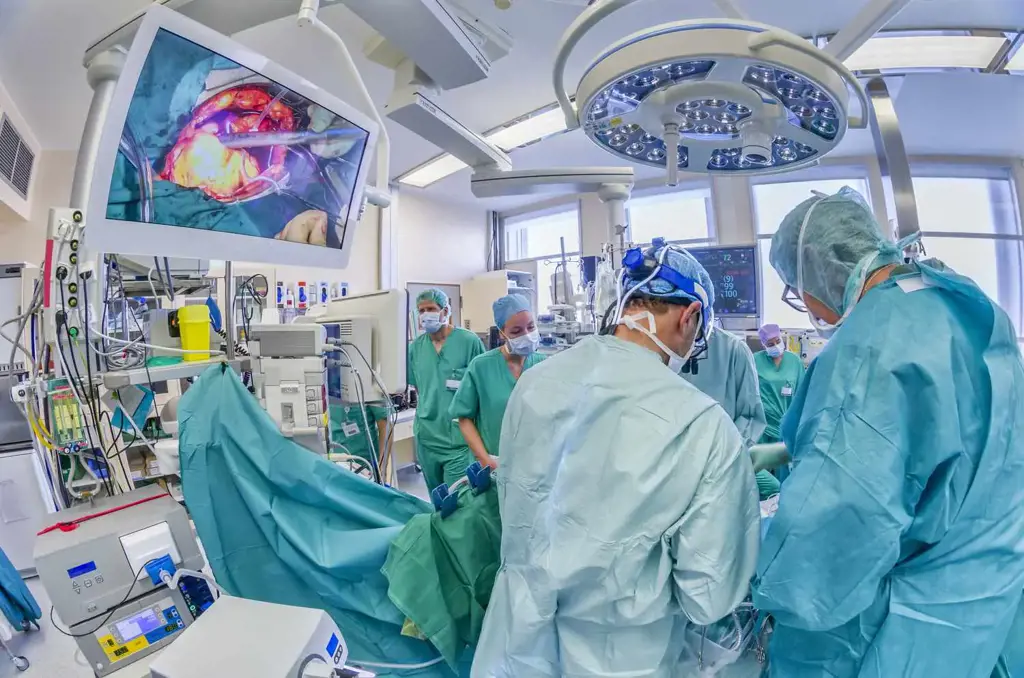
Open heart surgery can be a major and life-changing event. In order to ensure a successful procedure and a smooth recovery, there are several things that you should do before your surgery. One of the most important steps is to follow any pre-surgery instructions provided by your doctor or healthcare team. These instructions may include fasting for a certain number of hours before the surgery and stopping certain medications.
Fasting is typically required for open heart surgery to reduce the risk of complications during the procedure. It is important to follow the fasting guidelines provided by your doctor or surgical team, as failure to do so may result in the cancellation or delay of your surgery. In most cases, you will be asked to stop eating and drinking anything, including water, after midnight the night before your surgery. However, it is essential to follow the specific instructions given to you by your healthcare team, as there may be variations depending on your individual case.
In addition to fasting, you may be required to stop taking certain medications before your open heart surgery. Some medications can interfere with the surgery or interact with the anesthesia, potentially leading to complications. Your healthcare team will provide you with a list of medications to avoid and when to stop taking them. It is crucial to follow these instructions carefully and inform your doctor and surgical team about all the medications you are currently taking, including prescription drugs, over-the-counter medications, and supplements.
In some cases, you may be asked to take specific medications before your surgery. These medications are typically prescribed to prevent infections or other complications. It is important to take these medications as instructed by your healthcare team to ensure their maximum effectiveness.
Apart from fasting and stopping certain medications, you may also need to undergo various pre-surgery tests and evaluations. These tests are conducted to assess your overall health and identify any potential risks or complications that may arise during the procedure. These evaluations may include blood tests, electrocardiograms (ECGs), chest X-rays, and consultations with other medical specialists.
To ensure a successful open heart surgery and a smooth recovery, it is crucial to follow all the pre-surgery instructions provided by your healthcare team. This includes fasting as instructed, stopping or adjusting medications, and undergoing any required tests or evaluations. Remember to communicate openly with your doctor and surgical team, asking any questions or concerns that you may have. By doing so, you can ensure that you are fully prepared for your open heart surgery and increase the chances of a positive outcome.
12 Fun Things to Do in Kill Devil Hills
You may want to see also

Make arrangements for transportation to and from the hospital
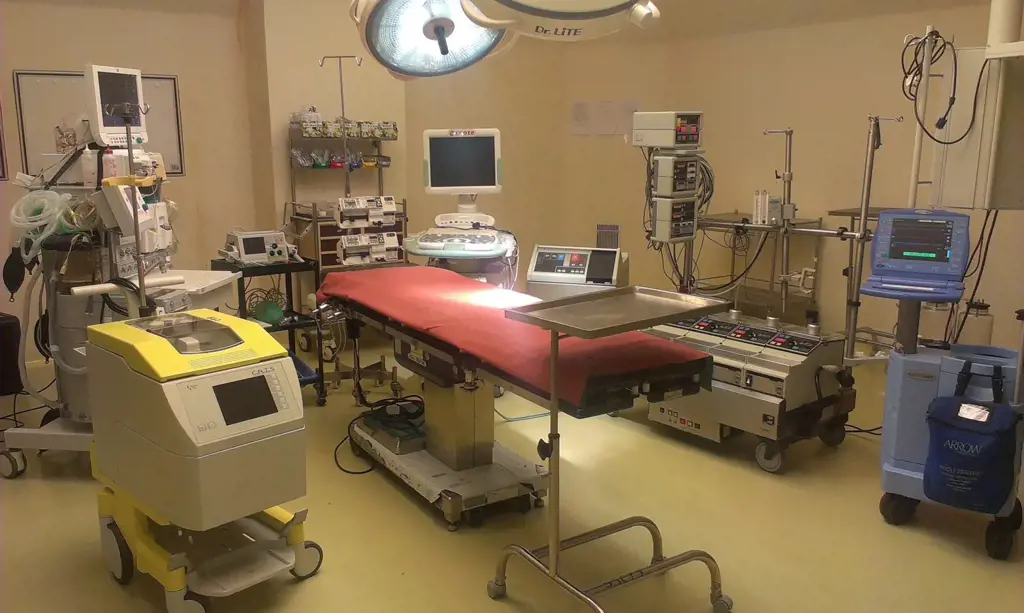
Open heart surgery is a major operation that requires careful preparation in order to ensure a successful and smooth recovery. One important aspect of preparation is making arrangements for transportation to and from the hospital where the surgery will take place. This task may seem simple, but it is crucial to have a reliable plan in place before the surgery date.
Firstly, it is important to consider the distance between your home and the hospital. If the hospital is located far away, it is advisable to arrange for transportation well in advance. Some patients may choose to drive themselves, while others may prefer to have a family member or friend drive them. In either case, it is important to make sure that the driver is comfortable with the route and has a valid driver's license.
In some cases, patients may be advised not to drive themselves due to the potentially dizzying effects of anesthesia and the strain of the surgery. In such cases, it is essential to plan for an alternate mode of transportation. Taxis or ride-sharing services like Uber or Lyft can be convenient options for those who do not have someone available to drive them. However, it is advisable to check with the hospital ahead of time to ensure that there is a designated drop-off and pick-up area for these services.
Another important consideration is the timing of the surgery. In many cases, open heart surgery is scheduled for the early morning hours. This can make transportation arrangements more challenging, especially if you live far from the hospital. It may be helpful to check with the hospital to see if there are any special parking arrangements for patients undergoing surgery. Some hospitals offer discounted or free parking for patients and their families during this time.
It is also important to plan for transportation after the surgery. Patients are typically required to stay in the hospital for a few days to ensure a full recovery. After the surgery, you may still be groggy from the anesthesia and may not be in a condition to drive or arrange your own transportation. Coordinate with a family member, friend, or caregiver who can pick you up from the hospital and take you home.
In summary, making arrangements for transportation to and from the hospital is an essential task before undergoing open heart surgery. Whether you choose to drive yourself, have a family member or friend drive you, or use alternative modes of transportation, it is important to plan and communicate your transportation needs in advance. By preparing ahead of time, you can ensure a smooth and comfortable journey to and from the hospital, allowing you to focus on your recovery and well-being.
12 Must-Do Activities in Berchtesgaden for an Unforgettable Trip
You may want to see also

Prepare your home for your recovery period, including arranging for assistance if needed

Preparing for open heart surgery involves more than just getting yourself physically ready. It also involves making sure your home is ready for your recovery period after the surgery. This includes arranging for any assistance you may need during this time.
One of the first things you should do is evaluate your home and make any necessary modifications to accommodate your recovery. This could include making sure there are clear pathways throughout your home, especially if you use a walker or wheelchair. Removing any potential tripping hazards such as loose rugs or cords can help prevent accidents.
You may also want to consider setting up a recovery area in your home. This can be a comfortable spot where you can relax and recover without disturbance. It should be somewhere easy to access, preferably on the main level of your home to avoid stairs if possible. Ensure that you have a comfortable chair or recliner with plenty of pillows and blankets to support your recovery.
Before your surgery, it’s also a good idea to stock up on essentials. Make sure you have an ample supply of toiletries, medications, and any necessary medical equipment such as a blood pressure monitor or oxygen tank if needed. You may also want to prepare some easy-to-prepare meals or arrange for meal delivery services to ensure you have nutritious meals during your recovery period. Having a well-stocked pantry and refrigerator can help minimize stress and allow you to focus on healing.
During your recovery period, you may find that you need additional help with daily activities. Reach out to friends, family, or neighbors to see if they can assist you with things like grocery shopping, meal preparation, or transportation to follow-up appointments. If you anticipate needing more extensive help, you may want to consider hiring a caregiver or arranging for home healthcare services.
It is also essential to communicate with your surgeon or healthcare team about any concerns or questions you have about your recovery. They can provide you with specific guidance based on your unique circumstances, including any precautions or restrictions you should follow.
In summary, preparing your home for your recovery period and arranging for assistance if needed are crucial steps to take before open heart surgery. By assessing your home, setting up a comfortable recovery area, stocking up on essentials, and seeking help when necessary, you can ensure a smoother and more comfortable recovery experience.
12 Fun Things to Do in Minot, North Dakota
You may want to see also

Plan for any needed time off work or other commitments
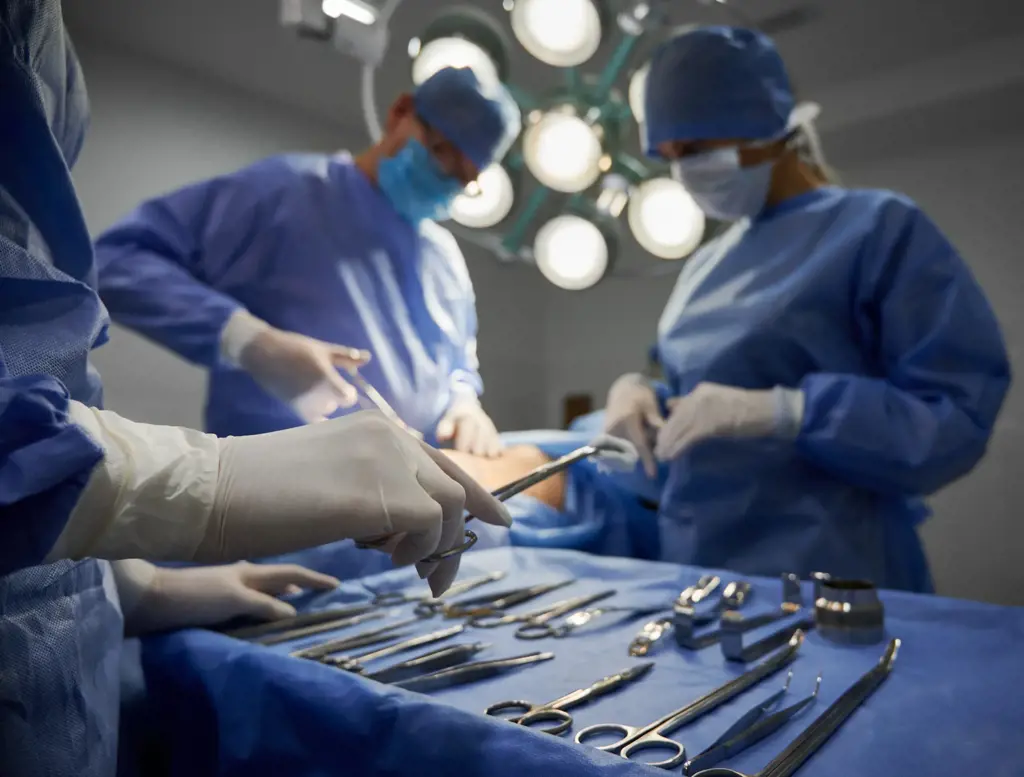
Open heart surgery is a major medical procedure that requires careful planning and preparation. If you are scheduled to undergo open heart surgery, there are several things you should do before the surgery to ensure a smooth and successful recovery.
One of the most important things to consider before open heart surgery is the amount of time you will need to take off work and other commitments. Recovery from open heart surgery can take several weeks, and it is important to give yourself enough time to heal properly.
First, you should consult with your doctor to get an estimate of how long your recovery will take. This will depend on a variety of factors including your overall health, the type of surgery you are having, and any complications that may arise. Your doctor will be able to give you a rough estimate of how long you will need to take off work.
Once you have a general idea of the length of your recovery, you can begin making plans to take time off work. If you have a regular job, you may need to inform your employer about your upcoming surgery and request time off. It is important to review your employee handbook or speak with your supervisor about any policies or procedures for taking medical leave.
In some cases, you may be eligible for short-term disability benefits, which can help provide financial support while you are unable to work. You should research your company's policies regarding disability benefits and consult with your human resources department for more information.
If you are self-employed or a freelancer, taking time off work may require more planning. It is important to inform your clients or customers about your upcoming surgery and make arrangements to ensure that your work will be covered while you are recovering. You may need to consider hiring temporary help or delegating tasks to others during your absence.
In addition to work, you may also need to make arrangements for other commitments such as childcare, eldercare, or household chores. It is important to identify individuals who can help you with these responsibilities while you are recovering. Reach out to family members, friends, or neighbors who can provide support during this time.
It is also a good idea to stock up on necessary supplies and medications before your surgery. You may need to have certain items on hand, such as pain medication, wound care supplies, or assistive devices. Make a list of these items and ensure that you have them readily available at home before your surgery.
Taking time off work and other commitments before open heart surgery is essential for a successful recovery. By planning ahead and making necessary arrangements, you can ensure that you have the support and resources you need during this time. Remember to consult with your doctor and healthcare team for personalized advice and guidance.
Suisun City CA: Explore Exciting Activities and Attractions!
You may want to see also

Pack a hospital bag with essentials like comfortable clothing and personal items
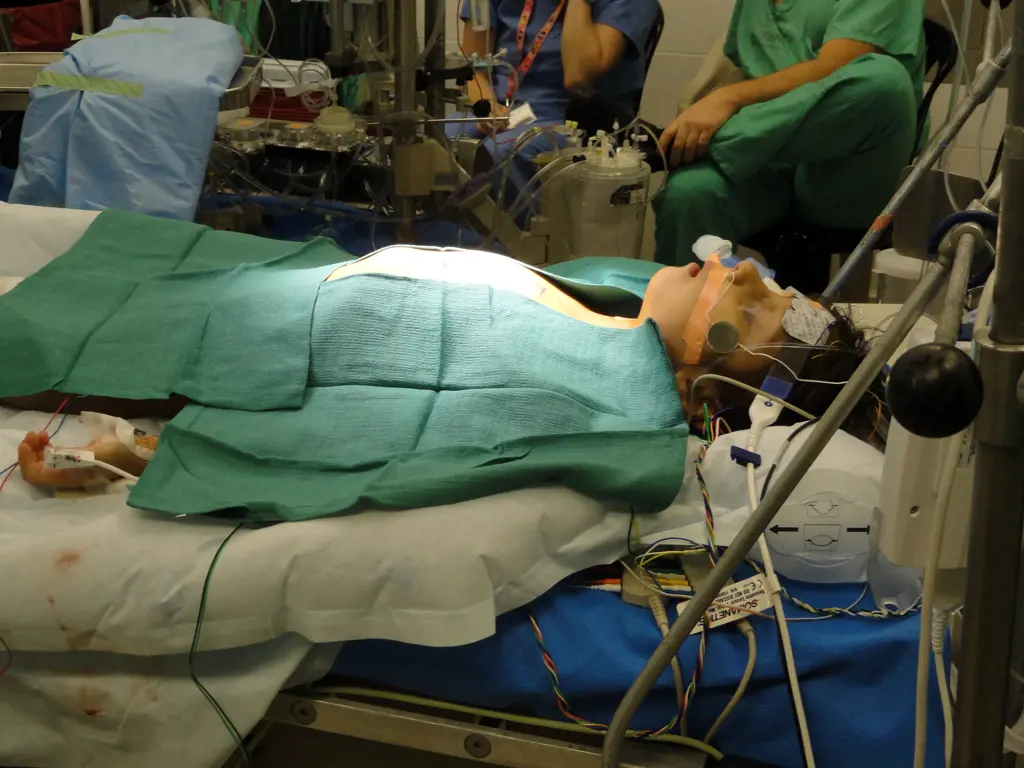
If you are scheduled to undergo open heart surgery, it is important to be prepared both mentally and physically for the procedure. One way to ensure a smoother hospital stay is to pack a hospital bag with essential items that will help you feel more comfortable during your recovery. Here are some things to consider including in your bag:
- Comfortable clothing: Pack loose-fitting, comfortable clothing that will be easy to put on and take off. Avoid clothing with tight waistbands or buttons, as they may irritate your incision site. Opt for clothes made of soft, breathable materials like cotton.
- Personal items: Bring any personal items that will help you feel more at ease during your hospital stay. This may include items like your favorite pillow, blanket, or stuffed animal. Having these familiar items with you can provide a sense of comfort and familiarity in an unfamiliar environment.
- Toiletries: Pack travel-sized toiletries such as toothpaste, toothbrush, shampoo, soap, and deodorant. These items will help you maintain your personal hygiene during your hospital stay. Remember to pack any necessary items like contact lenses, glasses, or hearing aids as well.
- Entertainment: Bring items to help pass the time during your recovery. Consider packing books, magazines, puzzles, or electronic devices like tablets or laptops. These will provide entertainment and distraction during your hospital stay.
- Snacks: While the hospital will provide meals, you may want to bring some of your favorite snacks to have on hand. Having snacks that you enjoy can help lift your spirits and provide some comfort during your stay.
- Important documents: Make sure to bring any necessary documents, including your medical history, insurance information, and a list of any medications you are currently taking. This will help ensure that the medical staff has all the necessary information for your surgery and post-operative care.
Remember that space in hospital rooms can be limited, so try to pack light and only bring the essentials. It may also be a good idea to check with your healthcare provider or hospital for any specific items they recommend or restrictions on what you can bring.
By taking the time to prepare a hospital bag with essential items, you can help make your recovery from open heart surgery a more comfortable and positive experience.
12 Exciting Things to Do in Los Angeles in October
You may want to see also

Arrange for someone to take care of any pets or plants while you are in the hospital

Open heart surgery is a major medical procedure that requires adequate preparation to ensure a smooth and successful operation. Before undergoing this operation, there are several important things you should do to prepare yourself physically, mentally, and logistically. One essential aspect is making arrangements for the care of your pets and plants while you are in the hospital.
When you undergo open heart surgery, you will likely spend several days or even weeks in the hospital. During this time, it is crucial to ensure that your pets and plants are well taken care of. Here are some steps you can take to make these arrangements:
- Find a trusted caregiver: Start by reaching out to friends, family, or neighbors who can temporarily take care of your pets or plants. Look for someone who is familiar with the needs of your pets and plants and who can provide them with the attention and care they require.
- Provide detailed instructions: Once you have chosen a caregiver, provide them with detailed instructions on how to take care of your pets and plants. Include information about their feeding schedules, any medications they may need, and any specific care instructions. If needed, schedule a meeting with the caregiver to go over these instructions in person.
- Stock up on supplies: Before your surgery, ensure that your caregiver has an adequate supply of pet food, litter, medications, and any other necessary supplies. Make a list of the essentials and purchase them in advance, so your caregiver won't have to worry about running out of necessary items.
- Plan for exercise and play: If you have dogs or other pets that require regular exercise, discuss with your caregiver how they can provide them with adequate physical activity. Consider explaining your pet's favorite toys or activities so that your caregiver can provide them with some form of entertainment and mental stimulation.
- Consider professional services: If you are unable to find a suitable caregiver among your friends or family, you may want to consider hiring professional pet sitters or plant care services. These professionals can provide specialized care for your pets and plants and ensure that they are well-taken care of in your absence.
- Provide contact information: Make sure to give your caregiver a list of emergency contact numbers, including your veterinarian's contact information. This way, if any issues arise, your caregiver can easily reach out for help or guidance.
Remember, the goal of making these arrangements is to minimize any stress or worry regarding the well-being of your pets and plants while you are undergoing open heart surgery. By taking the time to properly prepare for their care, you can focus on your own health and recovery without any additional burdens.
In summary, before undergoing open heart surgery, it is essential to arrange for someone to take care of your pets and plants while you are in the hospital. Find a trusted caregiver, provide them with detailed instructions, stock up on supplies, plan for exercise and play, consider professional services if needed, and provide emergency contact information. By ensuring that your beloved pets and plants are well taken care of, you can focus on your surgery and recovery with peace of mind.
12 Amazing Things to Do in Alta: Discover the Hidden Gem of Norway
You may want to see also

Take care of any financial or insurance matters related to the surgery
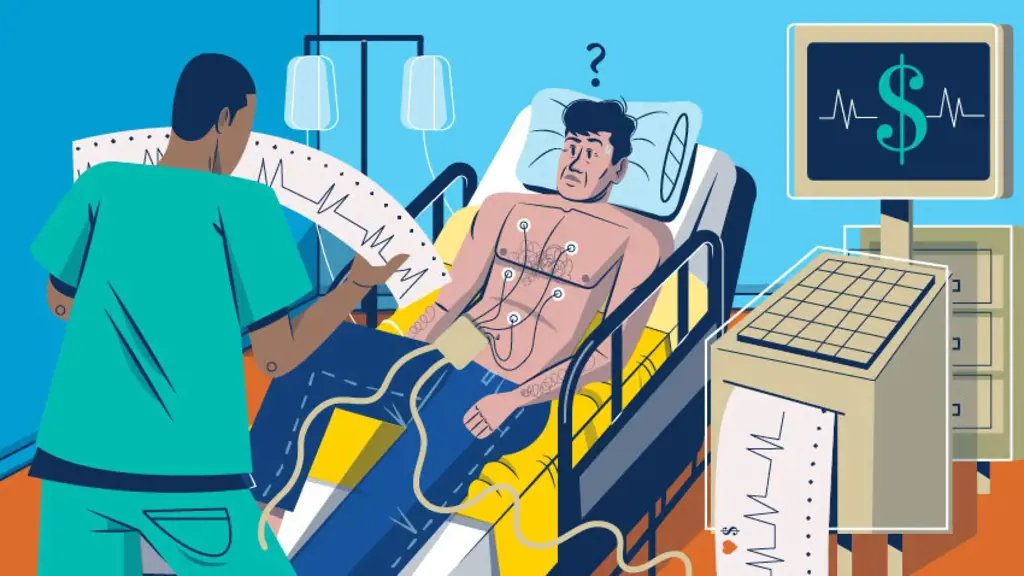
Open heart surgery is a major medical procedure that can have a significant impact on your health and lifestyle. It is essential to take care of certain financial and insurance matters before undergoing this surgery to ensure a smoother recovery process. In this article, we will discuss some important steps you should take before open heart surgery.
- Review your insurance coverage: Contact your insurance provider to understand your coverage for open heart surgery. Learn about the specific details such as the percentage of the surgical expenses that will be covered, any deductibles or co-pays you need to pay, and if there are any pre-authorization requirements. This information will help you plan your finances accordingly.
- Confirm the network status of your healthcare providers: If you have a preferred surgeon or hospital for open heart surgery, make sure they are in your insurance provider's network. Out-of-network providers may result in higher out-of-pocket expenses. Contact your insurance company to verify the network status of your healthcare providers.
- Understand the surgical costs: Open heart surgery can be expensive, and it is crucial to have a clear understanding of the overall costs involved. Speak to your healthcare provider to get an estimate of the surgical expenses, including the surgeon's fees, hospital charges, anesthesia costs, and any follow-up visits or rehabilitation sessions. Knowing the costs in advance will help you plan your budget and explore payment options if needed.
- Utilize your health savings account (HSA) or flexible spending account (FSA): If you have an HSA or FSA, consider using these funds to cover your out-of-pocket expenses related to open heart surgery. These accounts allow you to save pre-tax dollars for medical expenses and can help alleviate some financial burden.
- Speak to a financial counselor: Many hospitals have financial counselors who can provide guidance on managing medical bills and discuss available financial assistance programs. Schedule a meeting with a financial counselor before your surgery to understand the options available to you.
- Notify your employer: Inform your employer about your upcoming open heart surgery and discuss the possibility of taking time off work. Understand your rights under the Family and Medical Leave Act (FMLA) or any other applicable policy. It is essential to plan for potential loss of income and make arrangements accordingly.
- Plan for your recovery: Open heart surgery typically requires a significant recovery period. Consider factors such as potential loss of income during this period, transportation to and from medical appointments, and any additional support you may need during your recovery. Having a plan in place will help alleviate stress and ensure a smoother transition back to your daily routine.
Taking care of financial and insurance matters before open heart surgery is crucial to ensure a stress-free recovery process. By reviewing your insurance coverage, understanding the surgical costs, utilizing any applicable healthcare accounts, and seeking financial guidance, you can alleviate some of the financial burdens associated with this procedure. Remember to notify your employer and plan for your recovery to minimize any potential disruptions.
10 Exciting Events to Check out in Los Angeles this March
You may want to see also
Frequently asked questions
Before open heart surgery, there are a few steps you can take to prepare yourself. First, make sure to follow any instructions given by your surgeon or healthcare team. This may include stopping certain medications or dietary restrictions. It's also important to inform your healthcare team about any allergies you have or any past surgeries you've undergone. Finally, arrange for transportation to and from the hospital, and make sure you have someone to help you at home during your recovery period.
Typically, you will be instructed to avoid eating or drinking anything for a certain amount of time before your surgery. This is to reduce the risk of complications during the procedure. Your healthcare team will provide specific instructions regarding when to stop eating and drinking prior to your surgery. It's important to follow these instructions closely to ensure a successful surgery and recovery.
It is important to follow your surgeon's instructions regarding medications before open heart surgery. Some medications may need to be stopped prior to surgery, while others may be continued. Your surgeon will assess your individual situation and provide specific guidelines on which medications to stop and when to stop taking them. It's crucial to communicate any concerns or questions you have about your medications with your healthcare team.
The pre-operative assessment before open heart surgery typically involves a series of tests and consultations to evaluate your overall health and determine the best course of action for your surgery. These assessments may include blood tests, imaging tests, and a review of your medical history. You may also meet with various healthcare professionals, such as an anesthesiologist and a nurse, who will explain the surgical process and address any concerns you may have. The purpose of the pre-operative assessment is to ensure that you are physically and mentally prepared for the surgery.
Preparing mentally for open heart surgery is crucial for a smoother recovery. One way to mentally prepare is to educate yourself about the procedure and what to expect during the recovery process. This can help alleviate any anxiety or fears you may have. It's also important to surround yourself with a supportive network of family and friends who can provide emotional support during this time. Additionally, practicing relaxation techniques, such as deep breathing or meditation, can help reduce stress and promote a positive mindset before and after surgery. Lastly, don't hesitate to speak with a therapist or counselor who specializes in pre-operative anxiety if you're feeling overwhelmed. They can provide guidance and support to help you cope with any worries or concerns you may have.








4 Comments
Janice Burke
Herman Donnelly
Merve Nussman
AuthorDawson Page